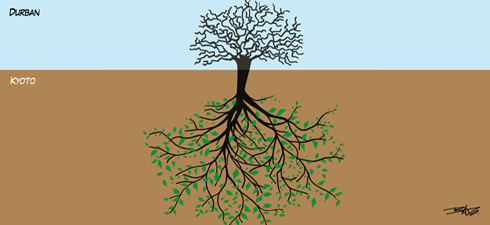The annual UN Christmas climate change market is underway once again, this year in Durban. Europe seems to have learned little from the conference in Copenhagen, where European idealism was the main reason it failed.
Then, developing countries were all too keen to go with the European approach, brushed aside all responsibility on their part, demanded compensation from industrialised countries for climate change (of course without any conditions on where those sums would go) as well as calling for draconian reductions in greenhouse gas emissions in the industrialised world.
Elsewhere, the oil-exporting countries played up to their role as victims by also seeking compensation for any decline in oil sales. Meanwhile, as pollution does nothing but rise in developing countries, major polluters including Russia, the US and China just shrugged.
Europe is addicted to giving aid
The world has changed; major developing countries are now being called upon to help save the euro. This new reality has hardly altered the European approach to climate change. The basic principle of the 1992 Climate Change Convention is that climate change is the joint responsibility of all countries, and therefore that of developing countries too.
Specific circumstances of a country and its potential must be taken into account of the specific circumstances, of course. Nevertheless, joint responsibility has increasingly slipped out of the picture. It is, after all, certainly not a very popularone.
Europe is addicted to giving aid and developing countries are eager to take full advantage of it. And a feeling of superiority plays a role that is expressed in the conviction that you cannot call upon the governments of developing countries to face up to their responsibilities. For instance, it is considered normal for a European company that is accused of polluting the environment not to face trial in Africa, but in Europe.
Would we tolerate this if a foreign company were to cause pollution in Europoort, Rotterdam? As long as we fail to take governments in developing countries seriously, international climate change policy is doomed to failure.
Accelerated deployment of technology
A term such as 'climate debt' may sound nice, but that does not make it a useful concept. Throughout history, most CO2 emissions occurred in industrialised countries, which contributed massivelt to the prosperity and living standards enjoyed in these countries, which, for this reason, are tremendously envied and imitated where possible by a large proportion of the world's population.
Nevertheless in Europe we must rid ourselves of the mix of the feeling of superiority and responsibility, guilt syndrome and the good Samaritan attitude. A more realistic approach would of course face resistance from deep-rooted opinion and interests in both Europe and elsewhere. However, a different approach certainly offers opportunities.
The key lies in the accelerated deployment of technology in the North and South. International cooperation must therefore be reinforced. It is in the area of technology that Europe, and certainly the Netherlands, must take the lead.
Was this article useful? If so we are delighted!
It is freely available because we believe that the right to free and independent information is essential for democracy. But this right is not guaranteed forever, and independence comes at a cost. We need your support in order to continue publishing independent, multilingual news for all Europeans.
Discover our subscription offers and their exclusive benefits and become a member of our community now!












